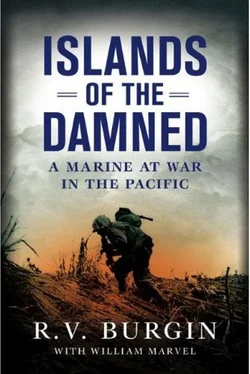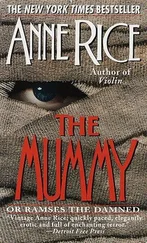In our last days on New Britain, the Navy established a PT base on Talasea to keep after Jap barge traffic along the coast. I loved those PT boats, and I wasn’t alone. We’d all go down and visit with the crews and swap lies, always trying to outdo one another. They’d invite us on board and we’d sit at the turrets and fire the guns. Get a feel for what it was like to be on one of those things. One of our guys, Fred Miller, went out on patrol with them one day, and when he got back, our captain gave him hell.
He said, “Miller, if you’re going to get your ass killed, I’d prefer you do it fighting with the Marines.”
Near the end of April LCMs carried the First and Third battalions back down the coast to Borgen Bay. Ten days later, about the first of May, they started shipping units out on LSTs. On May 4, the Third Battalion mustered down at the beach and, after waiting around for an hour or so as usual, dragged ourselves aboard the USS Elmore , an attack transport.
We must have been the very last Marines to leave New Britain.
The division had been battered pretty badly. We’d lost 1,347 men. Those of us who were left had oozing red rashes from jungle rot, or dysentery—“the shits”—or malaria.
We’d all heard we were headed back to Melbourne, and I prayed I would soon see Florence again.
We were in for an unpleasant surprise.
CHAPTER 4
First Battle of Pavuvu
So we were at sea again. The scuttlebutt was already circulating a day or two out when the USS Elmore ’s loudspeaker squawked to life and confirmed the bad news. We weren’t going back to Australia. We would disembark at a place we’d never heard of—Pavuvu, in the Russell I slands.
Before long we’d all wish we’d never heard of Pavuvu and would never hear of it again.
The story was that some Army officers had picked out the island from the air. Never set a foot on it. They were flying around in a little spotter plane and they looked down and saw the neat rows of palm trees. And somebody said, “Yup, this’ll do.” Just decided then and there that Pavuvu was where we’d be going for rehab and retraining.
Later we found out that we couldn’t blame it on the Army. One of our own had chosen Pavuvu—Major General Roy S. Geiger, commander of the Third Amphibious Corps. Guadalcanal was just sixty miles east. But Geiger didn’t want us there after what had happened to the Third Marine Division: after Bougainville they’d been sent to Guadalcanal for R & R, and the island command had run the men absolutely ragged on work parties. They were too worn out to fight.
So Pavuvu was it for us.
At first it didn’t look so bad. We pulled in late on May 7, 1944, and anchored in Macquitti Bay. From the deck of the Elmore we could see palm trees, a lagoon and sandy beaches. We didn’t get to disembark until the next morning, in the kind of rain we thought we’d left behind on New Britain. That’s when we got a close look at our new home.
The Navy’s construction battalions, the Seabees, had been there, but they hadn’t done much. There was one pier and a muddy road gouged through the palms. The flat part of the island, about six hundred acres, was covered by layers of rotten coconuts, and beneath that was mud. The place had been a plantation until the war started, when the people who owned and worked it took off. Ever since, those coconuts had been falling off the trees and rotting on the ground. Every now and then you’d hear one hit with a thwack! You learned to give the trees a wide berth. The smell was overwhelming. It was years before I could eat coconut again in any form.
Since the Seabees hadn’t finished the job, the first arrivals had to build the camp. They found the tents and cots piled on the beach, most of them soaked through by the rains. The ones on the bottom of the piles were moldy. Some of the cots would come apart in your hands. The bivouac areas were ankle-deep in slop. The new guys stood in the rain, patching the holes in the tents, trying to get a footing, trying to find a dry place to pound in the tent stakes, only to see them float away. There were no wooden platforms—there were never any platforms beneath our tents, from start to finish—and when you’d lie down on the cots they’d sink into the mud like they had on New Britain. Some of the men decided to hell with it and strung hammocks between palm trees.
By the time we got there things had improved a little. The six-man pyramid tents were up, but they were full of holes. There was still plenty of mud and rotting coconuts around and there wasn’t any electricity anywhere on the island, so we had no lights. Marines can improvise under any circumstances. We rounded up tin cans and bottles, filled them with sand, poured in gasoline, inserted a piece of rope and rigged up lamps. They started fires here and there, but at least we had enough light to read or write letters, which was all there was to do for a time.
Worse than the rotting coconuts, the rain, and the mud were the rats and the land crabs. They had pretty much taken over the place. You’d see and hear the rats mostly at night, skittering across the tents or sliding down the tent ropes. They lived in the tops of the palm trees, where it was almost impossible to get at them.
We’d encountered land crabs before, but here they were absolutely everywhere. They were about the size of a fist, and their black and blue color reminded me of a bruise. I’d get up in the morning and they’d be down in my boots. I’d shake them and two or three would fall out and go scuttling sideways across the floor of the tent. They’d get into our clothes, they’d get into our bedclothes. Some of the guys got so aggravated that one Sunday morning they went on a land crab roundup, gathering them by the hundreds and dumping them in the street, where they poured gasoline over them and set them on fire. The stink from the burning crabs made us forget the rotting coconuts for a while.
During the days, work details went out to scoop up the layers of coconuts and truck them to a swamp. After we came off New Britain we had added one gun to the mortars and I was made corporal, so I was exempt. But I sent out my share of those work details. Everyone would come back stinking of sour coconut milk. There was no running water on the island, and you’d see somebody standing out in the daily downpour with a bar of good Marine soap and a brush, hoping to scrub off the smell before the rain stopped. The rain always started at the same time. You could set your watch by it. But it stopped without a warning, like somebody turned off a big faucet in the sky. Even after such a “shower,” the stink of coconuts never seemed to go away.
When we weren’t moving coconuts, we had parties hauling crushed coral to pave the roads and lanes between the tents, trying to keep on top of the mud. We’d also fill our helmets with crushed coral and carry it in a bucket brigade to make a dry floor under our cots. If you could find a couple scraps of wood you were a rich man. You could put up a dry platform where you could stow your clothes and shoes and letters from home. I salvaged a board or two and propped up Florence’s photo. Guys were always showing off their girlfriends’ pictures, but I wanted to keep Florence to myself.
A week or so after I arrived at Pavuvu, my mail caught up to me. My sister Ila sent me a package of homemade strawberry jam and some cookies. They were all broken up in transit, but even the crumbs tasted good. Best of all, I got a bundle of letters from my precious Florence. I sat down and read them right away. I was also writing her whenever I had the time to spare. It cost seventy cents to send an airmail letter to Australia. Surface mail was free. Even though I was making only sixty-four dollars a month, I sent them by air as often as I could.
Читать дальше











